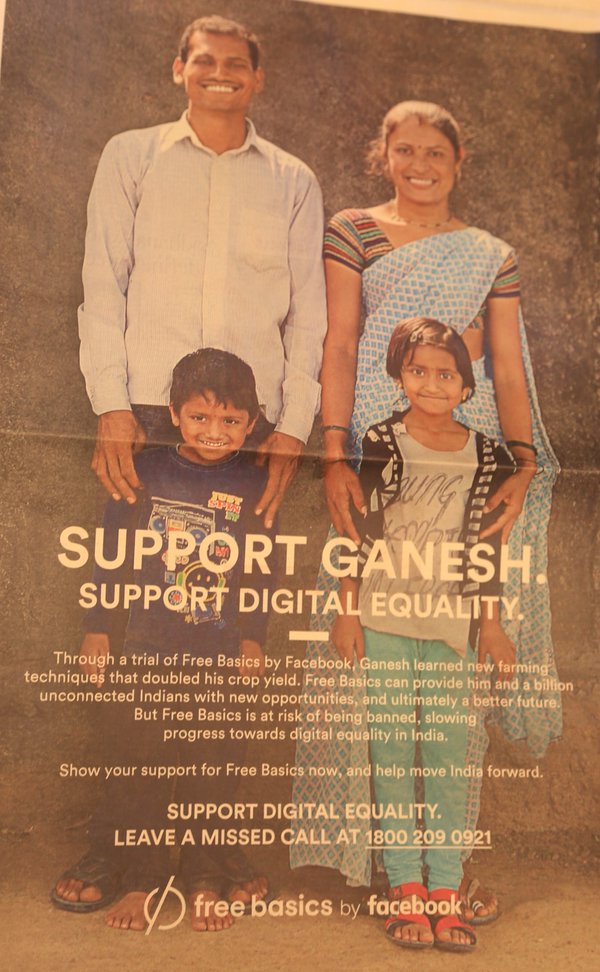Mark Zuckerberg thinks India should be more grateful for Facebook’s free internet
While he’s technically on paternity leave, he couldn’t sit idly by as India attempts to halt Internet.org, Facebook’s initiative to provide free but limited internet to the developing world.
Last week, the Times of India reported that the country’s telecom regulatory body had asked Facebook’s partner, wireless carrier Reliance, to cease the Internet.org service as it determines whether operators should be able to price their services based on content. Responding to criticisms of the program, Zuckerberg penned an op-ed published Dec. 28 in the English-language daily. In it, he expressed annoyance that India is debating net neutrality—a principle dictating that telecom operators provide people with equal access to the internet—as the country struggles to connect its citizens to the internet.
In the process of defending Internet.org, Zuckerberg paints India—where about a billion people are not connected to the internet—as backwards for even daring to question the benefits of Facebook’s charity-like endeavor.
“Who could possibly be against this?” he asks passive-aggressively. “Surprisingly, over the last year there’s been a big debate about this in India.”
To drum up more support, yesterday the VP of Internet.org Chris Daniels did a Reddit Ask Me Anything where he denied that Facebook was becoming a gatekeeper to the Internet. And today Facebook ran a double full-page ad in The Sunday Times Of India asking readers to pledge support for its corporate-run version of free Internet, spotted by Jeff Reifman. The conclusion of this battle could impact the digital fates of over 1.2 billion Indian citizens, and set a precedent for how other nations regulate Free Basics.
Net neutrality activists have long argued that Internet.org provides a “walled garden” experience because the sites that users can access for free are determined by Facebook and its telecom partners, essentially making them gatekeepers to the internet for poor people.
While Zuckerberg acknowledges that Internet.org, which is currently active in more than 30 countries, does not provide people with access to the full web, he argues that it’s a step in the right direction. According to the Facebook CEO, half of the people who come online for the first time using Internet.org decide to pay for full internet access within 30 days.
Instead of wanting to give people access to some basic internet services for free, critics of the program continue to spread false claims–even if that means leaving behind a billion people.
But examined more closely, his arguments don’t directly address the concerns of net neutrality activists. For the people who choose not to upgrade to or can’t afford to pay for full internet access, Internet.org does indeed provide a walled garden of online content. Millions of people already have a skewed perception of the web, believing Facebook to be the internet, a Quartz analysis has shown.
Read more on Quartz India
The Facebook Free Basics – Net Neutrality debate boils down to two sides:
- Facebook and Free Basics supporters believe some Internet is better than no Internet for people who can’t afford it. By requiring sites to be approved and not offer high-bandwidth services like video that quickly burn data, Facebook has convinced local mobile carriers to pay for people’s free access to low-bandwidth services. In exchange, Free Basics generates leads for the carriers, while promoting their own product.
- Net Neutrality advocates and Free Basics opponents believe that Internet.org’s limited free access violates net neutrality and creates a “poor Internet for poor people.” They think Facebook could exert malicious control by restricting what kinds of sites can be accessed, having the ability to modify the technical guidelines for what sites qualify for free access, and violating privacy. If Facebook’s services or others it selects get premier billing, it could be harder for new competitors to grow. Given Facebook’s size, opponents fear Free Basics could give Facebook too much power over the Internet.
The backlash in India centers on net neutrality, the principle that all Internet websites should be equally accessible. Critics accused the world’s largest social networking company of favoring a limited swath of the Internet and excluding rival services. And Facebook’s broader Internet.org initiative, including Free Basics, is seen as an effective way to draw more users onto a social network already used by over a billion people.
“We haven’t got a problem with free Internet as long as it’s open to all. Free Basics is just a way of locking in users into the Facebook ecosystem.”
Facebook Participation Guidelines for approval for Free Basics can be seen here.





